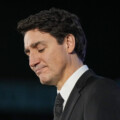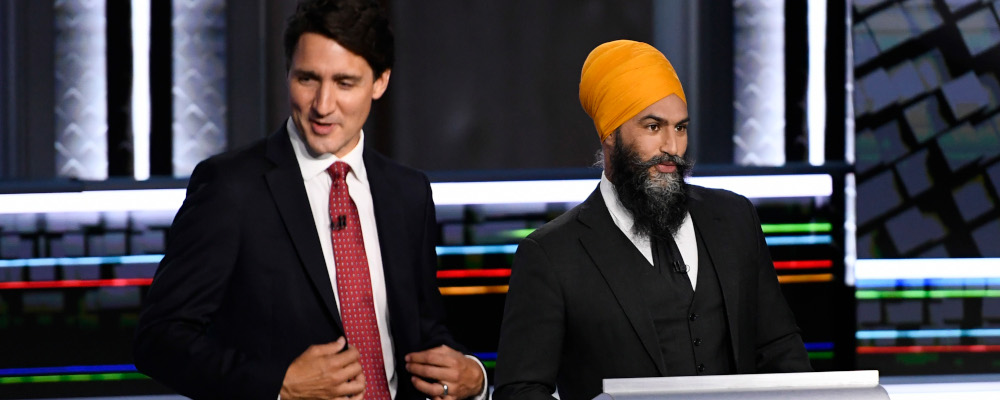A common and disturbing idea has emerged and entrenched itself in our politics: that our political leaders, and particularly our most recent prime ministers, are “traitors,” “criminals,” or “dictators.” Variations of these mantras were breathlessly repeated by those on the left when Stephen Harper was prime minister, as are they now being uttered by some conservatives as Prime Minister Justin Trudeau continues his third mandate.
To be clear: Trudeau and his predecessors are neither traitors nor dictators. But he and his government area remaking Canada in rapid order. Highly personal attacks on the prime minister diminish Canadian politics and largely miss the point about the current transformation in the federal government’s role and power. Baseless hysteria only distracts from the fact that a fundamental, and entirely legal, transformation is underway.
This transformation is perhaps best embodied by Trudeau’s stunning deal with Jagmeet Singh and the New Democratic Party.The Liberal-NDP governance agreement undermines the very notion of responsible government This arrangement gives him a broad runway and great political freedom, potentially for the next three years. The Liberals are now joined at the hip with a party that shares the prime minister’s commitment to social policy expansion, desire for aggressive climate change action, and lack of concern about budget deficits.
To a degree not seen since the 1960s, Canada appears to be heading into a major remaking of the welfare state and rebirth of the activist state. The Trudeau government may have started with a national daycare program and transformational agreement with Indigenous groups on childcare and social services. But the Liberal-NDP partnership is now also launching a (limited) national dental care program and is working on a pharmacare initiative, supposedly for 2023. The April budget included major (and overdue) investments in Indigenous housing.Budget reaction: We can’t have big government without paying for it The NDP supports the Liberal’s dramatic policies on carbon capture and climate change, even encouraging more aggressive action.
Canada has had a test run of this kind of political collaboration. After a tight 2021 Yukon election, the Liberal provincial government reached a comparable agreement with the three-member New Democratic Party.“Yukon’s Liberals and NDP have struck a deal to work together in the next Legislative Assembly — signalling that Yukoners will not be returning to the polls anytime soon. Liberal Leader Sandy Silver and NDP Leader Kate White on Wednesday announced a confidence and supply agreement ‘that creates a more formal bridge between our two caucuses,’ Silver said during a press conference Wednesday afternoon.” https://www.cbc.ca/news/canada/north/yukon-liberal-ndp-announcement-government-1.6006387 As with the federal arrangement, the Yukon deal saw the Liberal government embrace NDP priorities—including a dental program and rent control—while shifting their policies to align with NDP preferences. A year into the agreement, the Yukon government has proceeded along a reasonable path, with the New Democratic Party pressing the Liberals and with the government working carefully and with considerable autonomy within the agreement’s parameters.
The stakes are much greater at the federal level. The Trudeau government ran up surprisingly high deficits before the pandemic despite substantial economic growth and then shifted to massive deficits during the pandemic while the prime minister unleashed his preference for government intervention. Rather than entering a period of slow program growth as the economy rebounds and holding the course on the budget, as Saskatchewan’s government has recently done, the Trudeau government appears determined to accelerate its expansionary plans. The unexpected surge in tax revenues (including, ironically, a lovely pile of money from oil and gas revenue) did not provide for a moment any sense of fiscal discipline but rather became a justification for even more spending beyond our means.Liberals set to spend oil windfall on social and climate programs in today’s budget It is clear from Jagmeet Singh that the NDP expects nothing less and perhaps a fair bit more.
Yet these are not the acts of a traitor or a dictator. The Liberal-NDP supply and confidence agreement is compatible with Canadian parliamentary procedure and is no affront to democracy. In time, potentially as long as three years from now, Canadian electors will have the opportunity to pass judgment on the Liberal-NDP alliance. Until then, this agreement will define the shape of the federal government and likely transform the country, for better or worse.
Canadians need to think carefully about the path ahead. The Trudeau government has embraced large-scale budget deficits—to the point that the “mere” $50 billion deficit in the April 2022 budget was seen as a moderate course—and seems comfortable making an ongoing string of multi-billion announcements, with large downstream financial obligations. Wait until the federal, provincial, and territorial governments meet to discuss demands for more federal money for health care—let alone the obvious need for a reform of long-term seniors’ care in Canada. It is likely that the expansion of government services is far from complete.
Remarkably, these major social policies have come forward with little public debate. Canadians have accepted these massive expenditures with little criticism or thought about the long-term economic consequences. They were foreshadowed in previous federal elections, but the fate of political promises, including by the Liberal Party of Canada after 2015, made Canadians more than a little cynical about such “commitments.” With Ontario’s recent deal, the national childcare program is now fully operational.Ontario reaches $10.2B child-care deal: Here’s what parents need to know Precious few voices have been raised in opposition to this major expansion in the government’s role. The working poor in Canada desperately needed help—and more than this program will cover. Many families, however, would have preferred to have the support needed to keep one parent (or other family members) at home full-time, which many argue is better for the children. But national acquiescence was near total. To argue against a multi-billion dollars national child care program, it seems, was considered antediluvian.
Canada came to a fork in the road in the first months of 2022 and the prime minister, more or less on his own, chose the path forward. Parliament has been largely marginalized, with little role in the management of the pandemic. The NDP opted for partnership and a small share of power—and an outsized claim of the credit for these expensive social programs. The Conservatives were divided by internal conflict and an odd affinity for the Freedom Convoy; their usual vigilance on government overreach appears to have slipped, although they did rise up in righteous indignation about the NDP-Liberal budget and its substantial deficit. And early indications are that the largest plurality of Canadians are comfortable, if not necessarily supportive, of the federal government’s approach.“Half the country feels the Liberal-NDP agreement to keep the current government in power until 2025 was a betrayal of the people who voted for those two parties. Despite that, a majority of Canadians still support the deal, according to a new Ipsos poll.” https://globalnews.ca/news/8733368/ndp-liberal-deal-poll-support-agreement-betrayal-government/
Proper social programs must be matched by government revenue to be sustainable. The Liberal-NDP alliance has adopted the predictable “tax the rich” mantra, though economists have made it clear that the cost of these initiatives will be borne largely by the middle class. As program spending rises, and government intervention grows, so will the tax burden.
Significantly, the government’s commitment to spending money has not been matched by an equal devotion to building wealth, growing Canadian business, or increasing jobs. Indeed, its plans for the oil and gas industry will only have the opposite effect. Finance Minister Chrystia Freeland made small steps toward a growth plan, admitting that this had not been a government priority over the last seven years, yet has failed to acknowledge that the Liberal government’s anti-growth measures, particularly on natural resource development, have slowed entrepreneurship, deflected investment, and limited sustainable economic growth.
Canadians should not be surprised. The main elements of this plan were in the Liberal platforms from the last three federal elections and the NDP has never hidden its desire for a greater government role in Canadian life. Citizens must, however, recognize that it is rare for subsequent governments to walk back from major programs, meaning that these short-term commitments will turn into multi-generational obligations that only add to the cost and reach of government services.
Yet the path forward is not yet fixed. Provinces and territories will push back on federal intrusion into their areas of responsibility—and on the substantial call on their budgets. But Canadians should not be too quick to make their dental appointments, plan their pharmaceutical purchases, or leap into a new home purchase. The Government of Canada has not been particularly adept at rolling out major state initiatives; the gun registry, the Phoenix pay system for federal employees, the constant fiascos of defence procurement, and the slow progress on Indigenous infrastructure improvements do not instill much confidence.
Canadians need to be fully alert to what the Trudeau government has undertaken. Major decisions remain about the scope, scale, and speed of the new programs, but pandemic era spending and the April 2022 budget have set the rocket ship in motion. This ride is not over. It is just beginning. Though the prime minister is certainly no dictator, one can only be impressed with the audacity of the over-reach and the expansion of the role of the state in Canadian public life. Canada is being remade in real-time and Canadian acquiescence has been near complete.
Recommended for You

The Week in Polling: Most Canadians want Trudeau to resign; Canadians do not want to become the ’51st state’; and pride in the country drops double digits

Need to Know: Buckle up, we’re in for a wild ride in 2025

Theo Argitis: From a Trump shock to trade shifts to climate realities, here is what will shape Canada’s 2025 economic playbook

Sean Speer: Canada needs to kickstart its cultural policy



